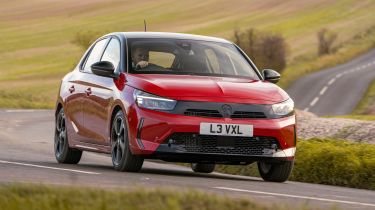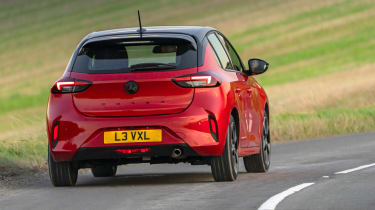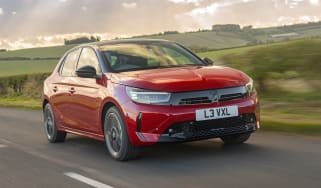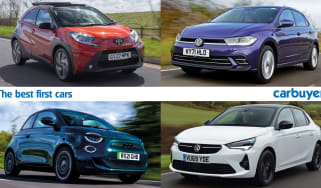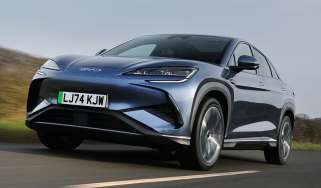Vauxhall Corsa review - Engines, drive & performance
A punchy 1.2-litre petrol now forms the backbone of the Vauxhall Corsa range
The Corsa’s 2023 facelift didn’t include any major changes to the car’s engines – the lineup still consists of the same 1.2-litre engine as before in a range of power outputs. The long-discontinued diesel engine option has not made a return as part of the facelift. In 2024 Vauxhall introduced two new mild-hybrid versions of the Corsa with a 28bhp electric motor to assist the 1.2-litre engine and improve efficiency. Depending on which you go for, this new setup produces either 99bhp or 134bhp.
When we drove it, the 2023 facelifted car felt mostly the same to drive as before, too. The suspension is slightly firmer than that of rivals and occasionally at motorway speeds it felt slightly bouncy. The Corsa is nimble through the corners, but it’s slightly hindered in terms of driving feel by its vague steering. Overall, though, most buyers will find the Corsa easy and relaxing enough to drive, and the cabin is well insulated from road noise, even when fitted with low-profile tyres and 17-inch alloys on GS and Ultimate trim.
Vauxhall Corsa petrol engines
A 1.2-litre three-cylinder petrol forms the backbone of the Corsa's engine range and it’s available in either 74bhp, 99bhp or 128bhp guise. The turbocharged 99bhp engine is our pick of the range, as it offers a significant improvement in performance over the non-turbo entry-level engine but is less expensive than the most powerful version.
More reviews
In-depth reviews
- Vauxhall Corsa review – the best Corsa yet
- Vauxhall Corsa Electric review - cheap to run, but expensive to buy
- Vauxhall Corsa GSi hatchback (2018-2020)
Road tests
Used car reviews
The GS version comes with various settings, including a Sport mode that makes the steering heavier and sharpens the throttle response. It also introduces a more enthusiastic engine sound through the car's speakers, and while not everyone is a fan of such devices, we found it sounded pretty authentic. It's a likeable engine, with plenty of performance given its power output. It gives the Corsa smooth acceleration and remains refined unless you really floor the accelerator.
Buyers will find a five-speed manual gearbox in the 74bhp version, which takes 12.4 seconds to do 0-62mph. The turbocharged 99bhp engine is fitted with a six-speed manual, which doesn't have the most precise action, and manages 0-62mph in 9.3 seconds. You can also pay extra for an eight-speed automatic gearbox with this engine, which is impressive for a supermini but results in slower acceleration, taking 10.2 seconds from 0-62mph. The 128bhp version can only be specced with an eight-speed automatic gearbox and covers 0-62mph in 8.2 seconds.
The mild-hybrid-assisted 1.2-litre petrol engines were added to the range as of early 2024. The cheaper of these is the 99bhp version, which we’d imagine will suit the majority of buyers in terms of power, while you’ll have to go for mid-range GS trim to get the most powerful 134bhp mild hybrid. Both these models are available solely with an automatic gearbox.
Despite the battery being on the small side, we were impressed with how long the engine would stay off at lower speeds, and like the noticeable regeneration and braking effect that recharges the battery when you lift off the accelerator. The engine restarts pretty seamlessly and the gearbox shifts smoothly, but it's best suited to relaxed driving, as the engine can sound coarse when asked to work hard.
Electric motor
Buyers after their first electric car will be pleased to know they now have a choice between two options. The 134bhp motor and a 57kWh battery from before the Corsa’s facelift have been carried over, but a more advanced and powerful version has also been introduced sitting above it, boasting 154bhp and a larger 62kWh battery. Read our full review of the Corsa Electric here.
